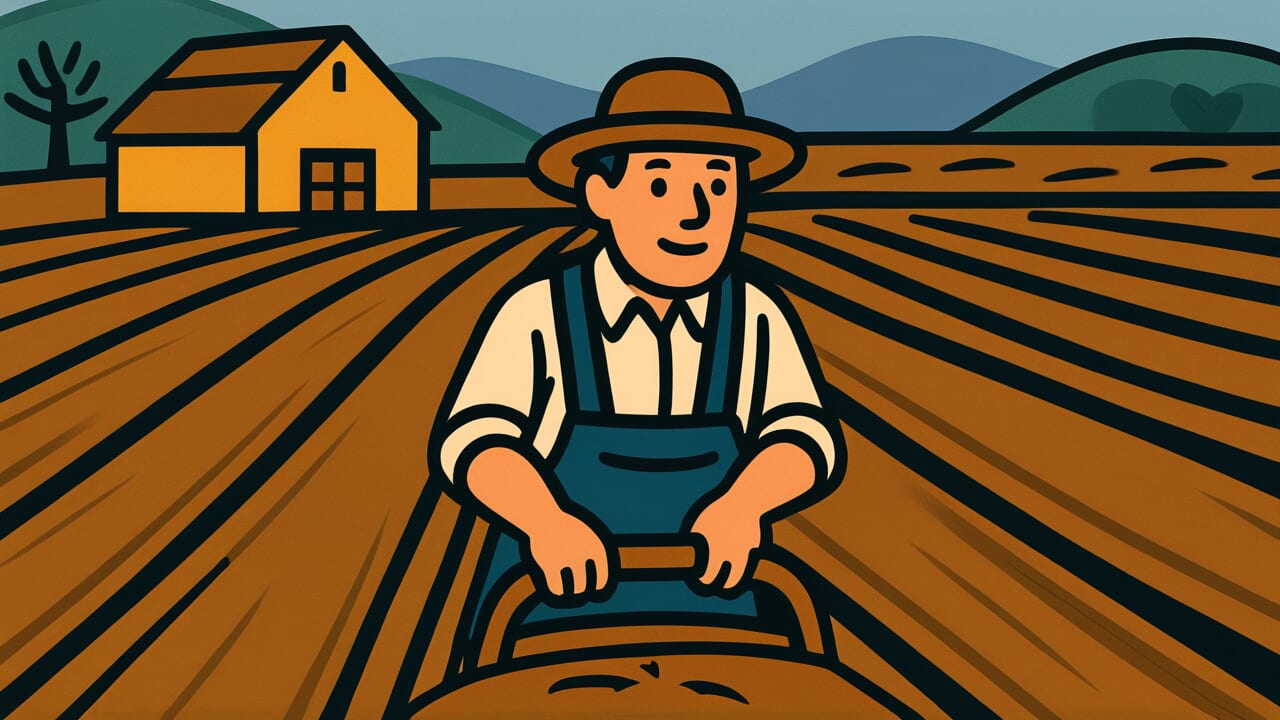How to Read “If one farmer does not plow, the people may starve because of it”
Ichi nōkō sazareba tami aru wa kore ga tame ni uuru
Meaning of “If one farmer does not plow, the people may starve because of it”
This proverb means that if even one farmer neglects their work, people will suffer from hunger. It shows how individual responsibility affects the entire society.
In an era when agriculture formed the foundation of society, each farmer’s work was crucial. The proverb warns against thinking “it won’t matter if just I slack off.”
That kind of thinking can actually threaten many people’s lives.
Today, fewer people work in agriculture. But the core message remains relevant.
It teaches the importance of everyone fulfilling their responsibilities in society-supporting roles. In healthcare, education, and infrastructure, one person’s negligence can affect many others.
Your work may seem small. But it’s actually a vital part that supports the whole society. This proverb reminds us to recognize that truth.
Origin and Etymology
This proverb likely comes from ancient Chinese classical thought. Similar expressions appear in the Confucian text “Book of Rites” and other ancient Chinese writings about agriculture as the foundation of the nation.
Ancient China widely shared the idea that “agriculture is the great foundation of all under heaven.” People’s lives completely depended on agricultural production.
Even one farmer neglecting their fields could eventually lead to widespread hunger. The proverb’s structure clearly shows this cause and effect.
The action of “one farmer” impacts “the people” as a whole.
In Japan too, agriculture was considered the national foundation from the Ritsuryō period through the Edo period. In the “shi-nō-kō-shō” class system, farmers ranked second after samurai.
This reflected recognition of food production’s importance. The proverb embodies this agricultural-centered worldview.
Rulers used it as a lesson, and it served as instruction for farmers. Its simplicity and clear cause-and-effect relationship gave it lasting power across generations.
Usage Examples
- As the saying goes, “If one farmer does not plow, the people may starve because of it”—infrastructure work allows no one to cut corners
- He embodies the spirit of “If one farmer does not plow, the people may starve because of it,” never cutting corners on even the smallest task
Universal Wisdom
This proverb endures because it addresses the eternal theme of individual versus collective in human society. We all face the temptation to think “just me alone won’t matter.”
In large organizations, our contributions can seem insignificant.
But society is built from countless individual contributions. When one person slacks off, it definitely affects someone else.
And if many people think “just me alone won’t matter,” the entire society collapses.
The proverb reveals the universal human weakness of laziness and its destructive power. At the same time, it teaches the magnitude of each person’s influence.
Your work may seem small. But it’s one thread in the large tapestry of society. If that thread breaks, the entire tapestry begins to unravel.
Ancient people understood this truth about individual responsibility and social fragility. Even in our modern world with advanced technology and complex systems, this essence hasn’t changed.
In fact, with deeper interdependence today, one person’s influence may be even greater.
When AI Hears This
The idea that one farmer stopping work causes famine might sound exaggerated. But from a complex systems perspective, this accurately captures “self-organized criticality.”
Drop sand grains one by one onto a sandpile’s peak. At some moment, a massive avalanche suddenly occurs.
You can’t predict which grain triggers it. But the entire system constantly maintains equilibrium at a critical point just before collapse. That’s why a single grain can collapse everything.
Ancient agricultural societies had the same structure. The balance between population and food production was always razor-thin, with almost no surplus.
In this state, one person’s crop failure triggers a chain reaction. When neighbors starve, labor decreases and other fields deteriorate.
Market prices then skyrocket, making food unaffordable for even more people. Individual farmers aren’t independent—they’re nodes in a tightly coupled network.
What’s interesting is that this fragility is actually the price of efficiency. Systems without surplus are optimized and waste-free during normal times.
But they’re equally vulnerable to shocks. Just like modern just-in-time production collapsed during the pandemic.
This proverb recognized over two thousand years ago that society constantly walks a tightrope on the critical point.
Lessons for Today
This proverb teaches modern people to recognize the weight of their roles. Whether you’re an office worker, student, or family member, you’re part of the larger social system.
The thought “just me alone won’t matter” is actually a dangerous idea many people share simultaneously. If you cut corners, it definitely affects someone.
People who use products you made. People who receive your services. People who work with you.
Invisibly, many people depend on your work.
At the same time, this proverb teaches your existence’s value. When you sincerely fulfill your role, you help many people.
Even work that seems small supports someone’s life.
In modern society, we easily lose sight of our work’s meaning. But every job has significance within society’s larger circulation.
Your honest work eventually connects to many people’s happiness.
Believe that, and do your best in your position today.



Comments